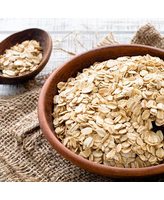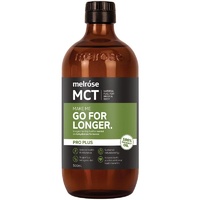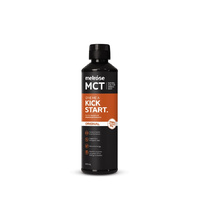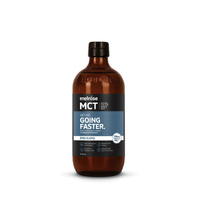MCT Oil - Fat or Fiction
Date Posted:20 October 2023
.png)
Unlocking the Benefits of MCT Oil: What You Need to Know
MCT oil, short for Medium-Chain Triglyceride oil, has gained popularity in recent years due to its potential health benefits and versatility.
MCT oil is a type of fat that is found naturally in some foods, including coconut oil. It is composed of medium-chain fatty acids, which are easier for the body to digest and convert into energy. MCT oil is clear, odorless, and tasteless, making it a versatile addition to your diet.
What is MCT Oil Used For?
MCT oil has a variety of uses, including:
Energy Source: MCTs are quickly absorbed and converted into energy, making MCT oil a popular choice for athletes and those following a low-carb or ketogenic diet.
Weight Management: Some studies suggest that MCT oil may help with weight loss by increasing feelings of fullness and boosting metabolism.
Brain Health: MCTs are believed to support cognitive function and may be beneficial for individuals with neurodegenerative conditions.
Digestive Health: MCTs can help improve gut health by promoting the growth of beneficial bacteria in the intestines.
Comparing MCT Oil to Coconut Oil
Coconut oil contains MCTs, but MCT oil is more concentrated and provides a higher dose of these beneficial fatty acids. If you're looking for a more potent source of MCTs, MCT oil is the better choice.
Baking with MCT Oil
MCT oil can be used for cooking and baking at low to medium temperatures. Its high smoke point makes it suitable for sautéing and light frying. However, it's not recommended for high-heat cooking.
MCT Oil in Coffee or Tea?
MCT oil is a popular addition to coffee and tea, often referred to as "bulletproof coffee" or "keto coffee." It can provide a sustained energy boost and help curb cravings.
Will MCT Oil Spike Insulin?
MCT oil is unlikely to cause a significant spike in insulin levels, making it a good choice for those following a low-carb or ketogenic diet.
How Often Should You Take MCT Oil?
The frequency of MCT oil consumption can vary from person to person. Some individuals take it daily, while others use it as needed for specific purposes like boosting energy or controlling appetite.
Is MCT Oil Bad for Cholesterol?
MCT oil may have a neutral or positive effect on cholesterol levels. Unlike long-chain fatty acids found in some oils, MCTs are less likely to raise LDL (bad) cholesterol.
When to Take MCT Oil on a Keto Diet?
MCT oil can be particularly beneficial for those on a ketogenic diet. Taking it in the morning or before a workout can help boost ketone production and provide sustained energy.
How to Use MCT Oil for Weight Loss
If weight loss is your goal, start with a small amount of MCT oil and gradually increase it. Consuming it before meals may help you feel full and reduce calorie intake.
How Much MCT Oil Each Day?
The ideal daily amount of MCT oil varies, but most people start with 1-2 tablespoons per day and adjust as needed based on individual responses.
Can You Have MCT Oil for Breakfast?
Yes, MCT oil can be incorporated into your breakfast routine by adding it to smoothies, oatmeal, or bulletproof coffee.
Where to Buy MCT Oil?
MCT oil is widely available and can be purchased online, at health food stores, or in some grocery stores.
Can You Use MCT Oil for Oil Pulling?
While coconut oil is commonly used for oil pulling, MCT oil can also be used for this practice. It may offer the same oral health benefits.
Is MCT Oil Safe in Pregnancy?
MCT oil is generally safe in moderation during pregnancy. However, it's essential to consult with your healthcare provider before adding any new supplement to your diet.
In conclusion, MCT oil is a versatile and potentially beneficial addition to your diet, offering a wide range of health and culinary uses. As with any dietary change, it's advisable to consult with a healthcare professional, especially if you have specific health concerns or conditions. Incorporating MCT oil into your routine may support your overall well-being and dietary goals.































